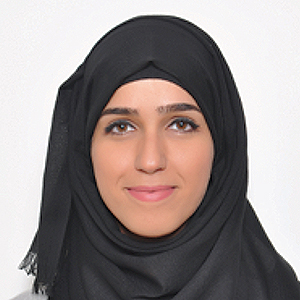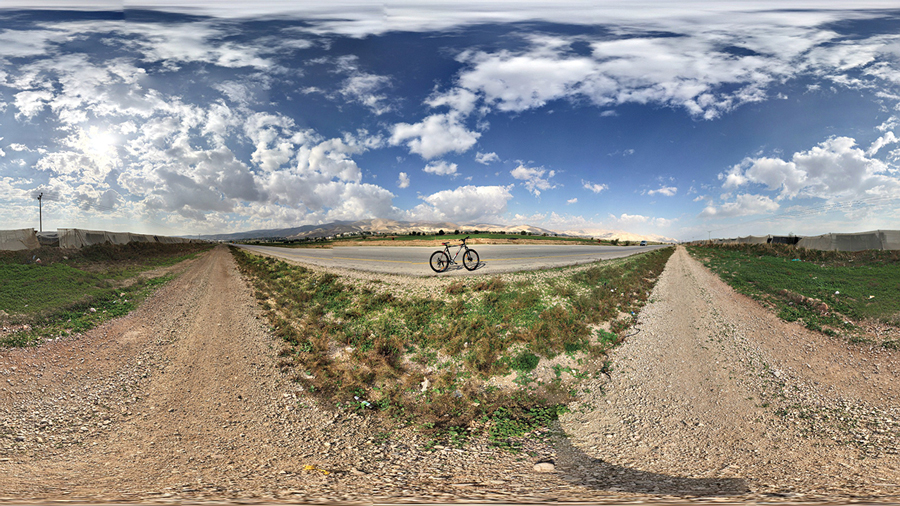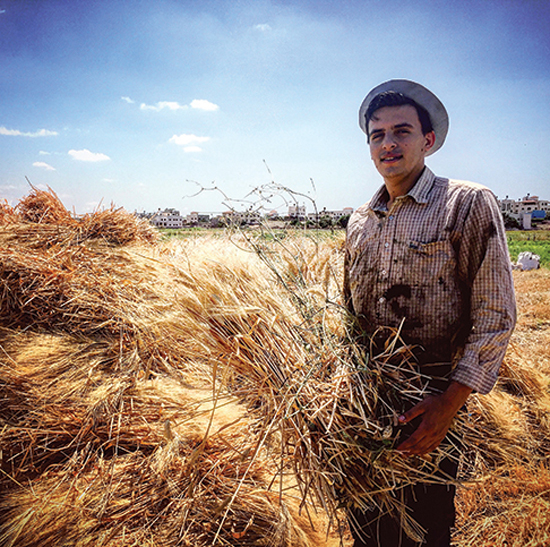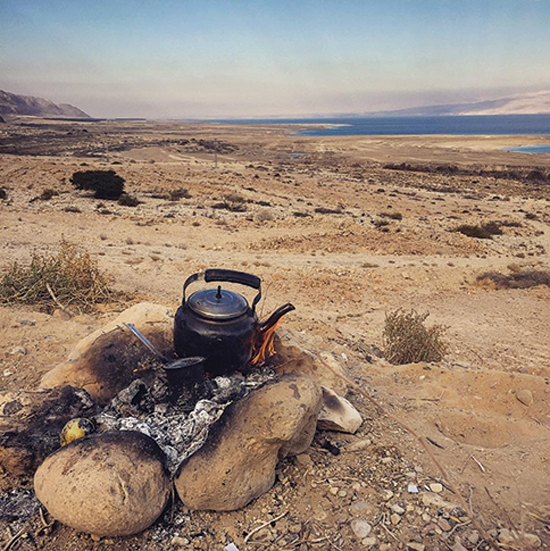The day always ends the same way, and those who know how to light a fire begin the search for dry sticks, branches, and rocks to build a stove to fit the pan and a teapot covered in soot. Others who have sharp-knife skills start to dice the plum tomatoes, chili green peppers, and aromatic garlic.
In no time, the fire begins to crackle and pans are passed to the person who is entrusted with the difficult task of preparing the famous Palestinian dish, qalayit el-bandoura maa filfil o thoom (cooked tomato with pepper and garlic.)
This dish has become the signature of Cycling Palestine, in Arabic Falastin ‘al Baskalit, a group of Palestinian youth who share a love for the sport of biking and exploration. For the cyclists who travel every Friday to a new destination in Palestine, the tomato pan has acquired a new unique flavor. We discovered that the best way to devour qalayit el-bandoura is while sitting shoulder to shoulder under an olive tree as the sun dives behind the near mountain or the olive groves in the distance.
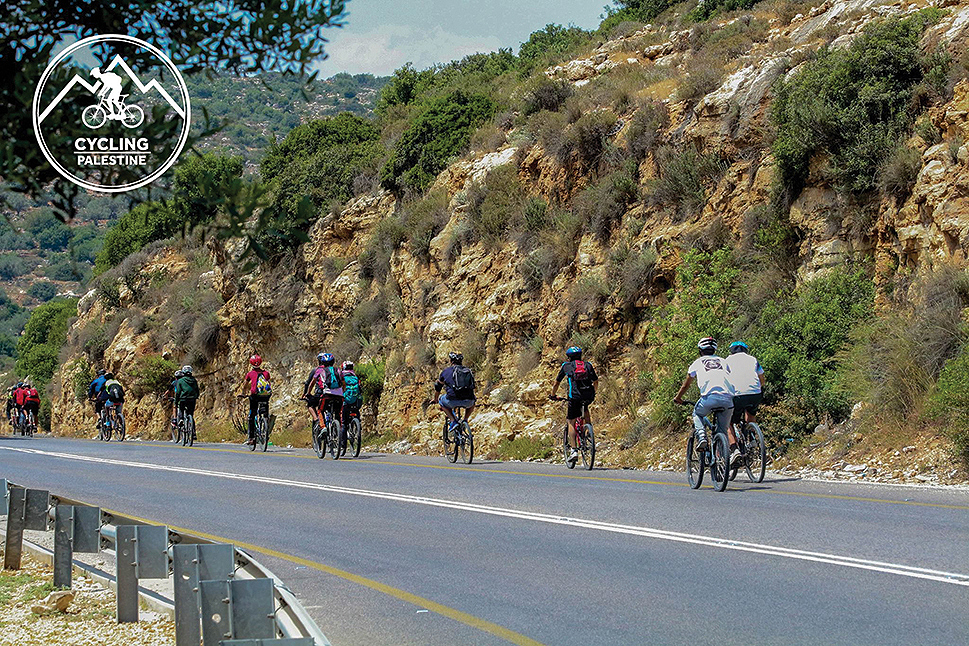
I still remember the first time I joined Cycling Palestine for the sake of practicing a sport I had never felt confident enough to pursue in Palestine due to social considerations. Cycling is not a common form of transport or sport in Palestine but more like a game for children. Many people who joined Cycling Palestine’s rides said that they couldn’t remember the last time they rode a bike, indicating that at one point in their life, usually at a young age, they abandoned the bike.
My first trip – probably one of the first trips organized by the group, then called Ramallah Riders – was a 25-kilometer ride from Jericho to Tubas. When Sohaib, one of the two founders of the group, handed me the bike, I couldn’t believe that I would finally get to ride a bicycle in Palestine. Soon I was overwhelmed with a new revelation; even though I had been to the Jordan Valley before, this was the first time that I had noticed its true splendor.
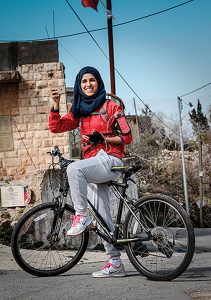 I am a journalist, and my job has taken me almost everywhere in the West Bank; to the crowded camp of Dheisheh and its beautiful alleys covered in graffiti breathing life into a fresh wound, to the ancient city of Nablus with its majestic mountains and old market bustling with life, and to the farthest towns to the south of Hebron and their silent hills only disturbed by the sound of wind flirting through its deeply rooted pine trees. I have visited dozens of villages, locales, towns, and cities to meet people, hear stories, and learn about the oral history of this highly addictive land.
I am a journalist, and my job has taken me almost everywhere in the West Bank; to the crowded camp of Dheisheh and its beautiful alleys covered in graffiti breathing life into a fresh wound, to the ancient city of Nablus with its majestic mountains and old market bustling with life, and to the farthest towns to the south of Hebron and their silent hills only disturbed by the sound of wind flirting through its deeply rooted pine trees. I have visited dozens of villages, locales, towns, and cities to meet people, hear stories, and learn about the oral history of this highly addictive land.
Every morning I would wake up, put on my most practical outfit and comfortable shoes, and find myself a yellow taxi to take me to my destination. I would then spend my commute time either chatting to my fellow journalists or going over my questions, wondering whether I had covered all aspects of the story. What would my readers want to know about that displaced family, this detained youth, or the many unjust deaths on unforgiving pavements?
For youth in particular, there is so much happening in Palestine that it is easy to lose faith in and appreciation of the place around them. They see what the media chooses to show them and live a reality curated by the Israeli occupation. For the new generation born in the era of skyrocketing technology and painful uncertainty, it has become easy to loathe home; especially one that it knows nothing about.
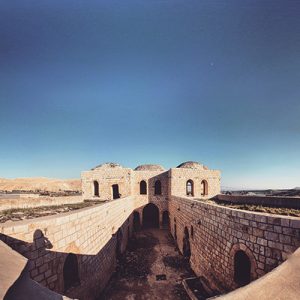 They are growing detached from their land and struggling to appreciate the idea of home, because they know nothing but the confined cities with their bland buildings, high-priced shops and coffeehouses, and crowded streets. It is sad to know that many Palestinian youth are now in their late twenties and have never been to the Jordan Valley or seen the rich groves on the way that leads to Hebron or even enjoyed the taste of a freshly cultivated Cucumis in Salfit.
They are growing detached from their land and struggling to appreciate the idea of home, because they know nothing but the confined cities with their bland buildings, high-priced shops and coffeehouses, and crowded streets. It is sad to know that many Palestinian youth are now in their late twenties and have never been to the Jordan Valley or seen the rich groves on the way that leads to Hebron or even enjoyed the taste of a freshly cultivated Cucumis in Salfit.
Cycling Palestine has become an escape for dozens of youth all over the West Bank who know how to ride a bike and want to spend their time away from computers and crowded shops.
Every Friday at around 7:30 am, we gather at Al-Manara Square with our bikes to wait for new members and old friends to join the ride. When our destination is in a far governorate, such as Jenin or Tulkarem, we take a bus with our bicycles carefully stored in a separate truck. Once we reach our destination, we unload the bikes, distribute helmets, and make sure everyone is well prepared. Then the exploration begins.
Many explore the country on foot, and I had done that for a long time. We used to hike over ten kilometers on each trip and learn a lot about our country. But since I started to use my bike to explore Palestine, I realize that it is a completely different experience. Personally, and for many of my friends, cycling has proved to be our favorite way to explore because of its many perks.
One of the most recent trips where we explored a rather fascinating attraction was to Bal’a, a village northwest of Tulkarem. The Ottoman Railway Tunnel, locally known as Al-Khariq, which roughly translates as the penetration, is the only railway tunnel in the West Bank. The tunnel, which was constructed as part of an Ottoman project to ease pilgrim travel, penetrates a hill that is a Roman site where historical remains and wells have been found.
The best thing about cycling to explore is the unexpected discoveries we often make. On our weekly route, we frequently go off-road and explore areas that most people pass by because they contain no obvious attractions. On our Dead Sea ride, we cycled for close to 40 kilometers to Ein Gedi and camped in a location overlooking the Dead Sea, far away from the crowded shores. On the way to Tubas, we camped in a beautifully sheltered field surrounded by grand rocks of all shades overlooking the borders with Jordan. We were later forced to leave the area by Israeli soldiers who claimed that the area is a firing zone.
Exploring by bike is also an environmentally friendly way to sightsee, which is why we felt at home in Farkha. This is a village to the south of Nablus that probably not many know about. It is a small place with a big heart. Its people love visitors and the environment. Farkha has an internationally certified organic farm with 400 dunums planted with olive trees and aims to spread the culture of organic farming throughout Palestine.
Another advantage that comes with exploring on two wheels is that you see vast areas in half the time you would need to do the same on foot. On the Tulkarem-Nablus main road lies Al-Mentar, which sits on top of a mountain and is surrounded by a fortress of pine trees. The resort is home to one of the richest museums created by a Palestinian collector who decided to put his collections on display for every Palestinian and foreign visitor. Al-Mentar is easy to reach if you have a car, but on foot it is far away. Biking is therefore the better and faster way to climb all the way up without a car.
Not only do you see new places in Palestine during these rides, but you also begin to understand the geography and its significance. We were taught in school that Palestine had a diverse geography with hills, valleys, mountains, and vast flat areas. Cycling has reinforced that lesson which I was taught in my UNRWA-run school more than ten years ago.
I remember when we decided to cycle to Sebastiya, a village 12 kilometers northwest of Nablus known for its history and archeology. I had a hands-on lesson about why it was home to over six successive cultures that date back more than 10,000 years. The road was very steep, and all of us got off our bikes and walked all the way up to the city. It was very tiring, but we understood how Sebastiya’s secure and challenging location had made it a desirable target for invading armies.
Another reason why I find cycling to be the best way to explore Palestine is that people are naturally drawn to the sight of anyone on a bike. Cycling culture is not as common in Palestine as it is in Europe. Therefore, seeing Palestinian youth on bikes in large groups is guaranteed to spark interest. No matter where I go, people approach me to look at my bike, try it out, and ask all sorts of questions. For anyone who wants to meet new people but doesn’t know how, biking is a great icebreaker.
After close to a year of cycling around Palestine, I feel that I have become a more enlightened person. I know much more about my country. I have met many people from different backgrounds and engaged in very interesting conversations. I learned about the history of villages, the climate, traditions, dialects, and various families and names.
Now whenever one of my Palestinian friends tells me they regret having no place to go to, I ask them to join Cycling Palestine or any of the many hiking groups. I tell them about the magical Wadi Qana and the old town of Deir Istiya in Salfit, the UNESCO-recognized terraces of Battir in Bethlehem, and of course the vibrant city of Ramallah and its rich villages.
A very wise friend of mine, Hamza Aqrabawi, who is a young historian, storyteller, and popular heritage enthusiast, once told a hiking group in Wadi Qelt that ignorance is harming our cause because we lack knowledge of the land, its geography and history. His motto, which has become the motto of almost all exploration groups, is “Roam the land and own it.” I sincerely encourage all youth to gradually spend more time exploring their country, whether on foot or on two wheels, and learn to appreciate Palestine’s diversity and complexity.
» Malak Hasan is head of the English desk at the Palestine News Agency WAFA and general secretary of the Palestinian Boxing Federation. In March 2017, Malak cycled for 500 kilometers from Qalandiya Refugee Camp, in Palestine, to Aqaba, in Jordan, to promote cycling as a sport among women and girls. You can follow her on Instagram @malak_hasan and watch her Palestine by Bike series on YouTube.
Article photos by the author.

